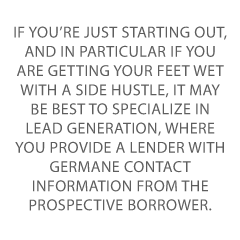Are you interested in learning all about how to become a business loan broker?
Helping others finance their small businesses can be an extremely satisfying and lucrative experience. You’re helping other people fulfill their business dreams—while potentially making up to six figures!
So, if you’ve ever thought about becoming a commercial loan broker, read on.
What Is a Business Loan Broker?
Business loan brokers make money by helping business owners get various types of loan products. These generally include business cash flow loans, equipment loans, expansion loans, and many other types of business financing.
The business broker does the legwork of finding financing options for business owners. Owning a business is a lot of time-consuming work, and finding the right loan or other financing deal is serious work. Owners just plain don’t have the time.
Enter the business loan broker. This person does the comparison shopping for the owner. The broker makes it their business to understand the loan options that are out there. The business owner doesn’t have to waste time with dead ends or deals that aren’t worth the time and effort.
The broker then presents the best choice(s) to the owner who then makes the final decision. The business broker is often paid a percentage out of the overall financed amount.
There are also brokers who work in lead generation. They provide the lender with pertinent contact information for the lead. Then someone from the company contacts them and completes the deal.
Training helps with being a broker, particularly training in the finance arena. There are no actual courses you can take, although having an Associate’s or Bachelor’s degree in finance or a related major is helpful for loan brokers.
Requirements of Being a Loan Broker
Not every state requires business brokers to be licensed. For states which do, then of course make sure to get a license. Check not only with your Secretary of State, but also with your city and county.
There are all sorts of training programs available, all with varying levels of education and hands-on training. A Bachelor’s degree is generally not required, although it’s a good idea all the same.
If you wish to attend the Commercial Loan Broker Institute, just keep in mind that it’s not strictly necessary. You can become a commercial loan broker without them.
Ofen, your easiest path to becoming a business loan broker is to work directly with a reputable lender or the like. In fact, Credit Suite offers such a program!
Determine which type of a loan broker you would like to become. For example, an SBA loan broker works with a small business to help them find an SBA lender who knows the industry and will work with them.
An equipment financing broker works with business owners (particularly those with bad credit) to help them finance equipment purchases and leases.
Keep in mind that the small business lending industry is so new that there aren’t rules or regulations in place regarding a borrower’s sensitive information. Still, a good broker will take measures to protect a client’s data online through encrypted technology.
Therefore, consider that to be your own personal requirement for becoming a broker—it will help you to earn the trust of your customers and prospects.
Advantages of Being a Loan Broker
Being a loan broker means you will have a significant potential for growth and earnings. Successful brokers can easily earn six figures per year. In addition, they are their own boss and can create their own work-life balance to fit their lifestyle.
Also, learning how to become a business loan broker is easy. You don’t need a huge startup investment, a finance degree, or several years of industry experience to get started.
Best practices are to take classes if not get a Bachelor’s degree in finance or a related field. And, of course, if your area requires licensing, then make sure you get a license and fulfill all requirements.
You will become a small business owner, so take steps to protect your personal scores and assets, such as incorporating and building separate business credit.
The easiest way to become a loan broker is to work directly with a lender or a similar provider (like Credit Suite), because you won’t have to go searching for leads—they will come directly to you!
At bottom, you will just need to have a passion for the job (which is true about virtually any vocation), appropriate training, a strong work ethic, and the right lender behind you.
Steps to Take to Be a Loan Broker
Step #1 – Determine the Type of Loan Broker You Would Like to Become
Specializing will make the transition a lot easier. Plus, you may find you prefer one area over another.
You should also investigate the opportunities in the area for working with a lender or the like. You may find that this narrows down your choices.
 If you’re just starting out, and in particular if you are getting your feet wet with a side hustle, it may be best to specialize in lead generation, where you provide a lender with germane contact information from the prospective borrower.
If you’re just starting out, and in particular if you are getting your feet wet with a side hustle, it may be best to specialize in lead generation, where you provide a lender with germane contact information from the prospective borrower.
You can also participate in a lender’s affiliate program to generate income while garnering experience and training. We put together a list of finance affiliate programs and real estate affiliate programs if that appeals to you.
And speaking of training….
Step #2 – Get Training
If you decide to work directly with lenders, they may offer training. Even if you think you know everything there is to know about being a broker (or even opening your own brokerage firm), go anyway.
Specialized training can only help you, and you will need to follow requirements for lenders anyway, in order to be paid. Learn about different types of funding (even for real estate) as that can only help you.
If you have the time and the interest, seriously consider going to college and getting at least a BA in finance or the like. College costs can be lowered by starting off at a two-year school. You may find that your experience counts toward your degree.
Brokers going to college can also benefit from using a 529 plan, and applying for any likely scholarships or other financial aid.
Step #3 – Get Set Up With a Lender or the Like
Loan brokers will most likely have to fill out some sort of broker referral agreement with lenders. And since you will be an independent contractor, you will have to fill out a W-9 form.
You will most likely also have to provide ACH information (such as a voided check) to lenders, so you can get direct deposit of your earnings. Lenders and other providers will want to get an ID from you, so have your driver’s license or your passport handy as well.
Package it all up and send it in, in whatever format the lender or provider is looking for. Answer any questions or provide any added information if requested.
Step #4 – Set Up Your Loan Broker Business
That is, if you have not already done so. Being, say, a mortgage broker still means that you own a small business. A proper business setup is still vital for success for loan brokers!
Fundability™ is still paramount. Loan brokers still need to build business credit, and set themselves up because, in the future, your loan brokerage could end up being the company that needs a small business loan.
Plus, loan brokers need a business bank account to have a place to put broker fee earnings. Why not set it up with the same lender you do most of your business with?
Step #5 Reflect and Reassess
If you’ve been working with, say, the Small Business Administration for a while, you may find that you love it. Or you may find that you want to work with multiple lenders, some of which may not offer SBA lending. Different lenders will have differing requirements, naturally.
You may find that hard money loans or merchant cash advances are no longer your cup of tea. That’s okay—the business loan marketplace is deep with choices. Maybe you’d prefer being able to make term loan offers or offer a business line of credit.
 Maybe you’d do best offering a credit card or a different loan program. Perhaps real estate funding is more your speed. As a small business loan broker with experience, lenders will be interested in working with you. You know business loan secrets!
Maybe you’d do best offering a credit card or a different loan program. Perhaps real estate funding is more your speed. As a small business loan broker with experience, lenders will be interested in working with you. You know business loan secrets!
Creating a relationship with a loan officer and being able to effectively fill out a loan application are both skills that are in demand.
Takeaways
Helping another business get financing can be exceptionally rewarding. From real estate funding to small business loan financing, loan brokers are a vital part of the financing ecosystem.
Entrepreneurs depend on loan brokers to get financing. And banks depend on a business loan broker for leads—for financing of their own.
If you’ve ever thought about helping companies get financing, or if you’ve ever been intrigued by our Business Loan Broker Challenge, then why not consider becoming a business loan broker for Credit Suite?
And becoming a business loan broker as a Credit Suite partner means you get the benefits of our training and our expertise with lenders. We offer loan brokers commissions on lending we get for their customers.
So let us deal with lenders. And loan brokers who work with us get access to our expert marketing materials, too.
Contact us today and learn more about how we can help you make some serious money—with training and proven marketing materials at your fingertips—and help your customers at the same time.
It’s a win-win-win situation. Why not go for it?
